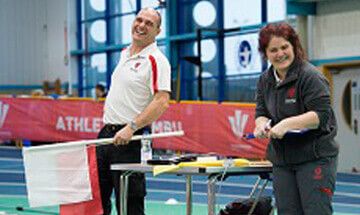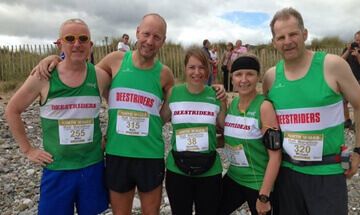
About Us
Tom Richards
Upper Cwmbran born Tom Richards was one of the most unassuming of all the great Welsh athletics stars. He was just as happy representing his club, as he was representing his country. He left the Gwent Valleys to work in South London during the depression of the 1930s but never forgot his Welsh roots. And at long last he is deservedly being inducted into the Welsh Athletics Hall of Fame.
Tom Richards was one of the most unassuming of all the great Welsh athletics stars. He was just as happy representing his club, as he was representing his country. to work in South London during the depression of the 1930s but never forgot his Welsh roots.
His place amongst the all-time greats of Welsh athletics, and Welsh sport, was assured when he became the first Welsh athlete to win an individual Olympic track and field medal when he took the silver medal in the marathon at the 1948 London Olympics at the remarkable age of 38. Only three other Welsh athletes have achieved the distinction since – John Disley (Bronze 3,000m steeplechase 1952), Lynn Davies (Gold long jump 1964) and Colin Jackson (Silver 110m hurdles 1988).
Along with many other Welsh distance stars, he left South Wales in 1936 because of the need to find work. Like a number of his contemporaries he found employment at Tooting Bec Hospital, in South London. His first London club was Mitcham AC, but due to their inactivity during WW2, he joined South London Harriers and remained with them until his death in 1985 aged 74.
Although his Olympic marathon silver medal in 1948 is the event for which he is best remembered by the general public, he was a prolific winner of UK road running and cross country honours during his remarkable career. He was still running competitively in 1972 at the age of 62 and most of his best performances came as a veteran (over 40). He ran his fastest marathon of 2:29:59 at the age of 44 in the 1954 Polytechnic event, and won his only Welsh cross country title at the age of 41.
One of his earliest successes came in walking events in Monmouthshire, but he soon graduated to cross country running and, after finishing third in the Welsh junior championships (junior in those days referred to ability, rather than age) at Caerleon in 1934, he won the first of his 10 Welsh international vests later that year in the International race in Scotland.
His only Welsh cross country title came in 1951 at the now defunct Caerleon Racecourse, when he beat John Edwards of Carmarthen YMCA by 24 secs. His last Welsh vest came two years later in Paris after finishing eighth in that year’s championship in Grangetown, Cardiff in a race won by Norman Wilson of the RAF. Altogether, he placed in the top 10 at the Welsh cross country championships on 11 occasions, including third in 1935 in a race won by three times winner Harry Gallivan (Cwmbran Harriers) at Llantarnam.
But it was as a road runner that he really excelled, as evidenced by his Olympic silver in 1948 and his wins in most the English classic events. He never won a AAA title, however, due mainly to the presence of all-time greats Jack Holden and former world record holder Jim Peters. He did finish second on four occasions (1947/48/49 and 51) and was also third in 1946.
His first Welsh marathon title came at Margam in 1950, and he won this event on a further four occasions. After his fifth successive win in the Finchley “20” in 1945, The Western Mail wrote:
“…..the Pontnewynydd man has perfected a technique of gliding over the ground with almost effortless ease, and, as a result, dominates distance running wherever he competes”.
At great personal expense he travelled to New Zealand in 1950 for the Auckland Empire (now Commonwealth) Games in the hope of bringing back another gold medal – this time for Wales. But the long journey by sea took its toll and he had to settle for fifth where the race went to his great friend, England’s Jack Holden who had dropped out of the 1948 Olympic race. The journey to New Zealand took 6 weeks, so in all he was away for 3 months, having taken unpaid leave to represent his country.
He is one of the finest distance runners produced by Britain and due to the esteem in which his fellow road runners held him, he was elected president of the Road Runners Club in 1962-1964, and president of his club, South London Harriers in 1974-1977. In 1955 the Welsh AAA awarded him their Meritorious Plaque for services to Welsh athletics and as D.J.P. Richards, author of the History of the Welsh AAA said in 1956: “Without doubt, he is the most accomplished distance road runner produced by Wales”. It took another 30 years before Steve Jones took this mantle, by setting his world marathon record in Chicago.
He died in 1984 aged 74 and his inclusion into the Hall of Fame on a posthumous basis is richly deserved and long overdue.
Adapted from The History of Welsh Athletics by John Collins, Alan and Brenda Currie, Mike Walters and Clive Williams, who was also the editor. Additional amendments made by Mick McGeoch, 2021.
Featured links
Useful pages within this section you may like to consider visiting.


